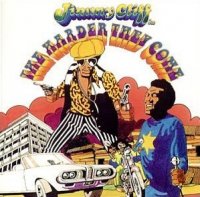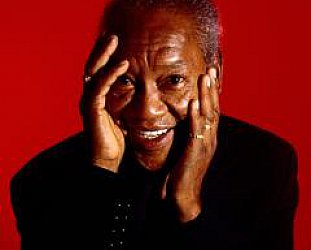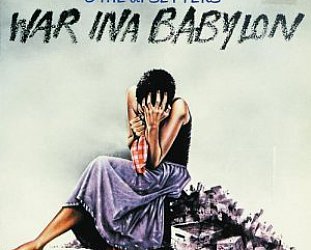Graham Reid | | 5 min read

Jimmy Cliff – the fundamental reggae pioneer -- could have been a contender.
Never quite the crown prince of reggae, a title taken without struggle by Bob Marley, Cliff nevertheless stacked up the kind of profile early in his career that marked him out as someone special.
He’s still doing it, still making fine music and by his own account on the road about six months of every year. And he still has that crystal-clear memorable voice that sparked such reggae classics as Many Rivers to Cross, Wonderful World, Beautiful People and House of Exile, adopted as the unofficial national anthem on the poverty-trap streets of some African nations.
Yet even far back as 1980 Melody Maker writer Vivien Goldman was noting how Cliff – star of Perry Henzell’s The Harder They Come movie of the early 70s – was “largely unnoticed by the new generation of reggae fans.”
Nothing in Cliff’s prolific recording career could account for his failure to hold the imagination of a Western audience, although he is still huge in Africa and by his own account sells “a lot of records in so called Third World countries.”
It may come down to timing. He arrived that fraction too early for pop culture and was replaced by the more visible rebel presences of the Marley generation.
Cliff, born in 1948, continues to assimilate music from the global village into his distinctive reggae, and his 1992 album Breakout, was replete with African and Brazilian sounds. But his is a career (“mission” is his word) which stretches back to the origins of reggae in the streets of Kingston, Jamaica, where he arrived at the age of 12 from his farm near Montego Bay.
With some justification Cliff styles himself an “originator” and back at the dawn of the 60s was recording for the legendary Leslie Kong. His first recording – for the lesser known Count Boysie – was Daisy Got Me Crazy, a ska tune which was never released but played on the mobile sound systems popular in Jamaica even today.
After bouncing around small labels, he was hooked up with Chris Blackwell’s Island and toured England with the Spencer Davis group and Blind Faith, and found his way to America and Africa.
It was in Africa he discovered his spiritual home, one to which he insists he will eventually return to live permanently.
“I have roots planted in Jamaica but I love Africa. I can never forget that first time going there in the early 70s. I was so amazed to have thousands of people lining both sides of the road on the five miles to town.
“But there were other things that were more important than all that . . . the different languages, colours, music. I was not unaware of the poverty, but what I expected to see was a place which was like Jamaica but with African roots.
“But I saw a place more than my expectation and I will eventually live in Africa. Strangely enough, it will be in South Africa, because they have all the modern technology I am used to in Jamaica, but also I can have Africa in its raw state, too.
“I’m waiting for the politics to cool down and it’s a shame there is so much bloodshed . . . but there really is no revolution without bloodshed. I expected it will resolve itself and from the early 80s I have been saying that by 1994 we will see one man, one vote there.
“Even when that happens, it will take another few years to settle – you’ll have the factional fighting like there was for a while in Zimbabwe. But then after that . . .
“And I will live there then.”
In South Africa, Cliff’s reggae with a message (always freedom, respect for the individual, peace and self-pride) is well received: “It has helped the liberation struggle. When Nelson Mandela came to Jamaica, he said that publicly.”
And as much as Cliff has sprung his own hits-with-a-conscience, he has given others theirs. Desmond Dekker and the Pioneers took You Can Get It If You Really Want It and Let Your Yeah Be Yeah.
And any numbers of artists have successfully covered Many Rivers to Cross (that passionate lament written in Dover when he was tossed out of his London bedsit because the landlord didn’t want “coloured people” in the house). Most recently Moana has covered Cliff’s Rebel in Me on her Tahi album.
That cross-cultural gesture by Moana is undoubtedly one Cliff, ever the assimilator of music, would appreciate. From the mid-70s onwards, Cliff – a Muslim convert from Rastafarianism in ’73 – sought to connect with the African roots of reggae and the displaced culture in the Caribbean.
On albums such as Special from ’82 he was – in the hands of Rolling Stones engineer Chris Kimsey and with Stone Ron Wood on board – marrying reggae, rock, Jamaican roots-drumming and Afro beats. It hasn’t always won him an audience, although he sprang an unexpected and untypical disco hit in ’81 with Gone Clear, but that hasn’t stopped him doing it.
The new album, Breakout, is typical of Cliff in the 90s: it is smart and possibly even a little slick, a bit state-of-the-art without the pristine compromise of other former roots acts, tosses deep traditional drums on to War A Africa, offers Samba Reggae with some Brazilian musicians and revisits his classic: Sitting in Limbo as Stepping Out of Limbo.
“When you are sitting in limbo you aren’t moving. Now I’m stepping out because I can see, there’s more light, I’m more experienced and I know where I’m going and how to get there. I’m stepping out into another kind of condition now.
“For Breakout I wanted to make an album with music that wasn’t Western but had Latin, Caribbean and African. That’s why it’s called Breakout.
“Brazil has a multicultural society but the music is predominantly African influenced because many people there have African roots. I wanted to make that connection and send it to people all over the world...not just people of African descent, but to all indigenous people.
“Someday I might make some music which involves some of the indigenous music of New Zealand. I like to do that, I’m an innovator.”
And while Cliff may have never capitalised on his high profile as the gun-toting ghetto rebel Ivan in The Harder They Come or that string of hits he once enjoyed – it has been well over a decade since a Cliff hit made the airwaves, though his tunes still provide raw material for ad agencies – he is still out there doing it.
His present tour has so far taken him through Brazil and Argentina, Europe twice, into Japan and Guam, Australia this week, next week New Zealand, and then it’s on through the States until late November, before he heads back home to Kingston, where he has his Cliff Sounds and Films (nothing produced in the past seven years from it, however).
If songs such as the soaring Haunted or pulsating Samba Reggae on Breakout are anything to go by, Jimmy Cliff is still a contender, albeit one whose title-shot has passed. Rasta reggae wasn’t his thing, so it went past him – and so did deep dub and ragga-stylee. So has dancehall and just about everything else.
Cliff’s direction has been the path less travelled . . . Pop-soul reggae with the colours of Africa – and latterly South America – over it.
But his place is securely in history.
“I know my work is a pioneer work,” he said 15 years ago. “The music coming out of Jamaica pioneered internationally. Everyone has their work; that is mine.”







terri - May 18, 2009
I saw The Harder they Come film again a few weeks ago. A classic. I had seen it when it first came out but couldn't remember much of it - or had a distorted memory of it.
Savepost a comment